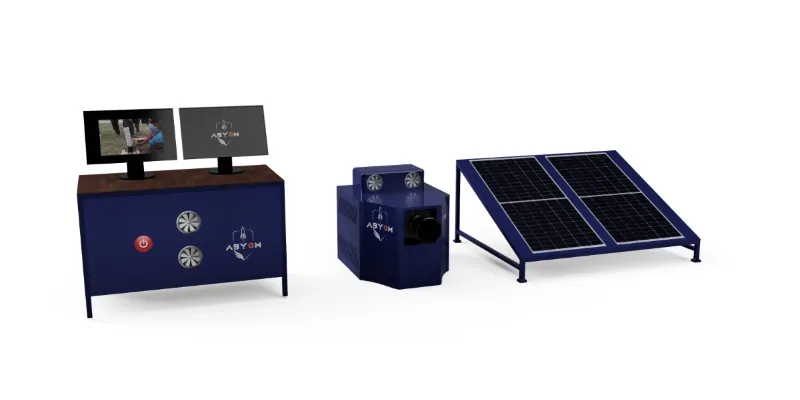[Startup Bharat] Gorakhpur-based Abyom is building a reusable launch vehicle to solve space debris problems
Founded in 2020, Gorakhpur-based startup Abyom Spacetech and Defence is doing the R&D for a Reusable Launch Vehicle (RLV) with a mission to make India's space sector fully reusable and save Earth from space debris.
After finding similarities in his name with the late aerospace scientist and former President of India, Avul Pakir Jainulabdeen Abdul Kalam during his high school years, entrepreneur Jainul Abedin became completely fascinated by rocket science and spacetech.
By the time he cleared Class 12, he knew that he wanted to be an entrepreneur and work in the spacetech segment.
Jainul’s love for spacetech led him to launch Gorakhpur-based in 2020. The DPIIT-recognised startup is working to build reusable launch vehicles with an idea to make India's space sector fully “reusable” and save the Earth from debris.

Abyom Thrust Vector Control [Image Credit: Abyom]
Speaking to YourStory, Jainul says, “Generally rockets become ‘unusable’ after the launch. With reusable launch vehicles (RLV), the vehicles are expected to come back and make a landing on the Earth’s surface to be used later in other missions.”
He explains that with reusable rockets, the cost of space missions can come down as space agencies will not need to build a new rocket every time, adding that Abyom aims to solve the landing mechanism in the launch vehicles.
Focusing on Reusable Launch Vehicles
Reusable launch vehicle technology will not only bring down the costs of space missions but also reduce space debris or space waste-related issues.
If rockets can come back to the surface, it will reduce the accumulation of rocket waste in space.
Abyom is currently working on the research and development of its RLV. Jainul says the startup has now developed and tested the reference model of the thrust vector control (TVC)

Illustration: YS Design
“The full-scale model will be developed further. Our TVC model provides complete flexibility as it is controlled with our own dedicated system in real-time. We have used the 3rd servo motor to tilt the entire TVC assembly at a particular angle. This will help us to visualise each component in action mode,” he explains.
The founder reveals that the startup is looking to raise funds to develop and manufacture its full scale micro-level portable engine for the RLV.
Apart from this, the startup has also developed Abyom Portable Micro Level Rocket Engine Testing System operated on solar power to help researchers in rocket science for R&D and designing.
Business and more
The founder says the bootstrapped startup is currently looking for funding to further develop its launch vehicle.
“I participated in several competitions personally and raised grant money to launch Abyom. Now, we are looking to raise funds to further develop our launch vehicle. If we can get funding, we are targeting our first launch by 2024,” he says.
As the launch vehicle is under research at the moment, Abyom also has opened up a research training programme where it provides online training to students and researchers on rocket science. It charges a fee for the course to generate revenue and fund the launch vehicle production.

Abyom Portable Micro Level Rocket Engine Testing System [Image Credit: Abyom]
A report by Mordor Intelligence reveals that the global reusable launch vehicles market is expected to grow at a CAGR of over 5 percent from 2021 to 2026. The growth is mainly driven by increased demand for satellite networks and services.
According to media reports, ISRO is also currently evaluating reusable launch vehicle technology while Space X and NASA already have reusable launch vehicles.
In 2020, spacetech became a buzzword in the Indian startup ecosystem after new reforms were announced to liberalise the space sector and open it up for the private sector.
A report by Space Foundation revealed that the global space industry grew by 4.4 percent in 2020 to become a $447 billion economy. However, India’s contribution currently accounts for less than 2 percent. The new reforms and opening up of the sector are aimed at increasing India’s contribution to 10 percent.
With India looking to increase commercial space missions, undertake important missions such as Gaganyaan, technologies such as reusable launch vehicles will be crucial to solving space debris challenges also bring down the cost of missions.
YourStory’s flagship startup-tech and leadership conference will return virtually for its 13th edition on October 25-30, 2021. Sign up for updates on TechSparks or to express your interest in partnerships and speaker opportunities here.
For more on TechSparks 2021, click here.
Edited by Teja Lele


![[Startup Bharat] Gorakhpur-based Abyom is building a reusable launch vehicle to solve space debris problems](https://images.yourstory.com/cs/2/b094ec506da611eab285b7ee8106293d/AbyomImage-Tag-TemplateMaster-1634221521428.png?mode=crop&crop=faces&ar=2%3A1&format=auto&w=1920&q=75)
![[Startup Bharat] Guwahati-based Fooppers promises doorstep delivery of fresh meat, seafood](https://images.yourstory.com/cs/2/e641e900925711e9926177f451727da9/Startupbharat-17-1634177272837.png?fm=png&auto=format&h=100&w=100&crop=entropy&fit=crop)
![[Startup Bharat] Jaipur-based NeoDove aims to be the go-to lead generator for SMEs](https://images.yourstory.com/cs/2/604090802d6d11e9aa979329348d4c3e/SB-58-1633966762809.png?fm=png&auto=format&h=100&w=100&crop=entropy&fit=crop)




